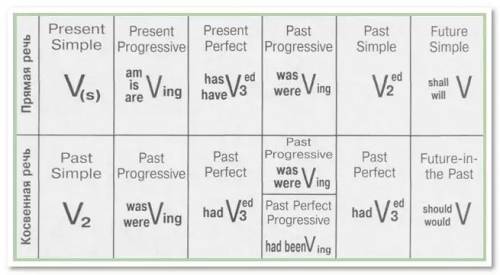I disagree with that. After all, teenagers spend only part of their time on their smartphones. All teenagers go to school and devote their time to study and communication with friends. Some of them go to some sports venues, thus enjoying their favorite hobby. Aren't adults playing on cell phones? They do it too, but they don't notice it themselves. Most teenagers use smartphones in order to find out the necessary information or just to communicate. After all, everything is created precisely on this. There are also advantages: the child learns to write correctly when he types a message. So teenagers use their smartphones, but they do it right and necessary.
Объяснение:
Это довольно сложная тема.
Смотри, при преобразование прямой речи в косвенную, прямая речь преобразуется в время.
То есть, Present Simple (настоящее простое)→ на простое):
Present Continuous→Past Continuous
Past simple→Past Perfect
Present Perfect→Past Perfect
Past Perfect→Past Perfect
Past Continuous→ Past Perfect Continuous
(Future Simpe)Will→Would(Future -in-the past)
Can→Could
May/Might→Might
Should→Should
Must/have to→Must or had to
Ought to→Ought to
Present Perfect Continuous→Past Perfect Continuous
Например: ''I love you''- Nastya said ---- She said that she loved me( Prasent Simple на Past Simple)
Впереди всегда ставится To be( she, he,they,we...) said/told/ask
Told используется когда к кому-то обращаются. Например: She told me/us/them/her/him that she had called the day before.
Ask используется в вопросительных предложениях. Например: He ask,'' Did you study?'' преобразуется в He asked me if I had studyed.
При преобразовании вопроса в косвенную речь He/she/they asked me if ( формула) добавляется I had studyed( не как вопрос did you study?, мы должны преобразовать этот вопрос в утвердительное предложение, то есть did you study? ---- I studyed и уже его изменить на косвенное предложение I studyed( Past Simple) --- I had studyed( Past Perfect)
Не обязательно ставить везде that, так просто проще для понимания
Так же есть слова которые тоже изменяются и их нужно заучить,запомнить
Прямая речь Косвенная речь
today that day
now then/at the moment
yesterday the day before
... day/year/month ago ... day/year/month before
last week/day/year the week/day/year before
next week/day the following week/day
tomorrow the next/following day
here there
this that
these those
ago previously/before
tonight that night

Lucy didn't watch TV last night
Where did they play yesterday?
What did you cook for supper?
Tanya danced at the party yesterday
Nelly visited her friend last Saturday